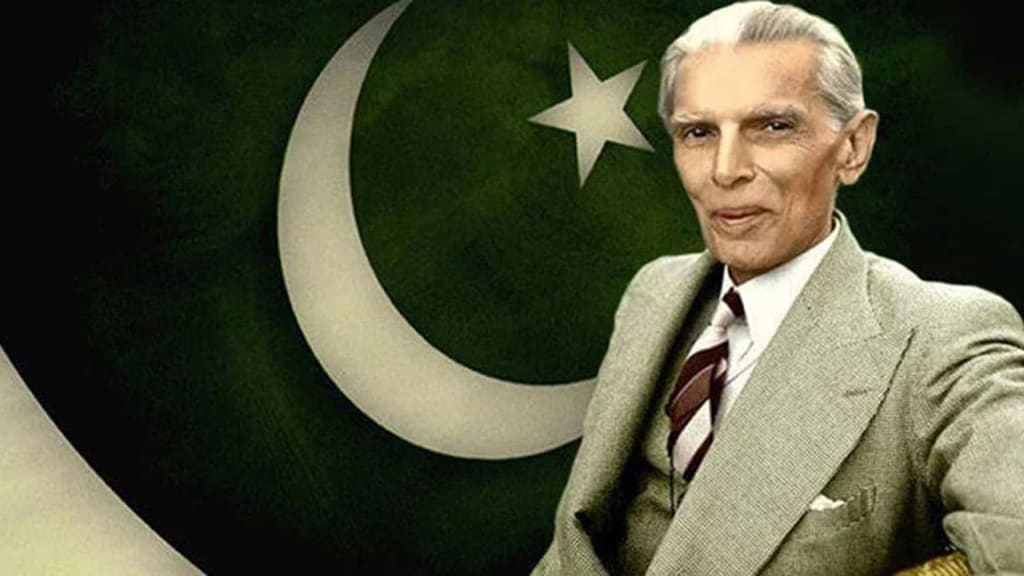The Person Who Changed History.
Complete biography of Quaid e Azam Muhammad Ali Jinnah.

Quaid-e-Azam is a title given to Muhammad Ali Jinnah, who is known as the founder of Pakistan. He was a prominent lawyer, politician, and statesman who led the movement for an independent Muslim state in the Indian subcontinent, which resulted in the creation of Pakistan in 1947. Jinnah was born on December 25, 1876, in Karachi, which was then part of British India. He played a significant role in the negotiations with the British government that led to the creation of Pakistan as a separate country for Muslims. He served as Pakistan's first Governor-General until his death on September 11, 1948. Jinnah is widely revered as a national hero and is often referred to as "Quaid-e-Azam," which means "Great Leader."
Muhammad Ali Jinnah was born on December 25, 1876, in Karachi, which was then part of British India. He was the second of seven children in his family, and his father was a prosperous merchant. Jinnah received his early education at the Sindh-Madrasa-tul-Islam in Karachi, where he excelled in his studies. He later moved to England to study law at Lincoln's Inn, where he became one of the first Muslim barristers to be called to the bar.
After completing his studies, Jinnah returned to India and began his legal career in Bombay (now Mumbai). He quickly became a successful lawyer and was known for his sharp legal mind and excellent oratory skills. In 1906, he joined the All India Muslim League, a political party dedicated to the protection and advancement of Muslim rights.
As the leader of the Muslim League, Jinnah worked tirelessly to promote the cause of Muslim rights and independence. He argued that Muslims were a separate nation with distinct cultural and political interests and needed a separate state to protect their rights. Jinnah's vision for a separate Muslim state became more prominent in the 1940 Lahore Resolution, which called for the creation of independent states for Muslims in northern and eastern India.
During World War II, Jinnah worked closely with the British government to secure greater political rights for Indian Muslims. However, as the war drew to a close, tensions between Hindus and Muslims in India increased, and Jinnah's call for a separate state became more urgent.
In 1947, the British government announced its plan to withdraw from India, and Jinnah's efforts to secure a separate Muslim state finally bore fruit. The Indian Independence Act was passed, and India was divided into two separate countries, India and Pakistan. Jinnah became the Governor-General of Pakistan and worked to establish a new government and nation.
Jinnah's leadership and advocacy were instrumental in securing a separate homeland for Indian Muslims. His tireless efforts and political acumen were crucial in negotiations with the British government and other political parties, resulting in the creation of Pakistan as a separate country.
Unfortunately, Jinnah's health began to deteriorate soon after Pakistan's independence. He suffered from tuberculosis, and his condition worsened rapidly. He died on September 11, 1948, at the age of 71.
Muhammad Ali Jinnah's services towards the Muslims of the Indian subcontinent were immense. He devoted his life to the cause of Indian Muslims and fought tirelessly for their rights and independence.
Jinnah began his political career as a member of the Indian National Congress, which was a leading political organization advocating for India's independence from British rule. However, he soon became disillusioned with the Congress's policies, which he felt did not adequately represent the interests of Muslims. In 1913, he joined the All India Muslim League, a political party dedicated to the protection and advancement of Muslim rights.
As the leader of the Muslim League, Jinnah worked tirelessly to promote the cause of Muslim rights and independence. He led the movement for a separate Muslim state, which eventually led to the creation of Pakistan in 1947. He argued that a separate state was necessary to protect Muslim rights and interests, which he felt were not being adequately represented in the united India movement.
Jinnah's leadership and advocacy were instrumental in securing a separate homeland for Indian Muslims. His tireless efforts and political acumen were crucial in negotiations with the British government and other political parties, resulting in the creation of Pakistan as a separate country.
Jinnah's services towards the Muslims of the subcontinent were significant and have had a lasting impact on the region's history and politics. His vision of a separate homeland for Muslims has shaped the development of Pakistan as a nation, and his legacy continues to inspire people in Pakistan and around the world.
In conclusion, Muhammad Ali Jinnah was a remarkable leader who devoted his life to the cause of Indian Muslims. He fought tirelessly for their rights and independence and worked to establish a new nation, Pakistan. His vision and leadership continue to inspire people in Pakistan and around the world, and he is widely revered as a national hero and a great leader.
About the Creator
Tamseela Arooj
Meet me: writer, procrastinator, fridge enthusiast. Dreaming of a best-seller that's actually worth reading.






Comments
There are no comments for this story
Be the first to respond and start the conversation.